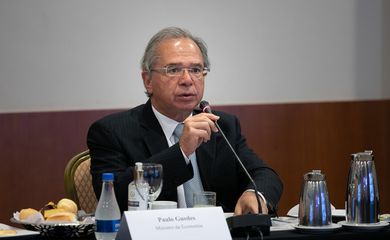Guedes talks Mercosur modernization, suggests cut in bloc tariff

Brazil’s Economy Minister Paulo Guedes said today (Aug. 19) that Mercosur does not play a role as important as it initially used to, when it served as a sort of “propeller” for the country to make progress in its efforts to increase competitiveness.

The bloc “has not come up to the expectations,” he said, even though it still is a “valid and important tool.” The solution to that, Guedes said, centers around modernization. The remarks were made during a Thursday (19) public hearing at the Senate on the expansion and modernization of the bloc formed by Brazil, Argentina, Uruguay, and Paraguay.
“In the last 30 years, global trade increased significantly and pulled 3.7 billion people out of poverty, raising per capita income. Meanwhile, when we were pioneers in creating large blocs for commercial integration, we started being left behind,” the minister said early in his address.
Guedes said that Mercosur was “a great success” as a platform to strengthen bloc integration and to boost the Brazilian economy on the global stage. “It was a sort of propeller for Brazil to become part of the global economy,” the minister said, recalling that, from 1991 to 1998, Mercosur’s participation in the Brazilian trade current went up from nine to 18 percent. “After that, it started to go down,” he added.
“At first it was a sustaining force for our integrating power. From that point on, we took a downward turn and now it’s six to seven percent—less than half of what it’s been in the past. Mercosur hasn’t come up to the expectations originally announced, and, after a solid start, with regional integration, it started losing importance over time,” he argued.
Common External Tariff
Guedes added he continues to believe the bloc is a “valid and important” platform.” “But we need to modernize this tool. This modernization includes a reduction in the Common External Tariff (CET), because we’re above the rest of the world, which has become integrated. Out in the world, it stands at an average four to five percent, and for Mercosur it’s 13 percent,” the minister said amid criticism on the difficulties Argentina has imposed on this cut.
Early this year, Brazil proposed to the bloc the first revision in the CET, whose average rate is reported at 13.4 percent. At first, the proposal was a 20 percent reduction. Later on, Brazil’s economic staff lowered it to ten percent in 2021, and another 10 percent in 2022—to be applied on the current rate.
Another issue being deliberated on is the proposal to make trade talks more flexible between regional group and other countries by means of a change in the Asunción Treaty, loosening the requirement for joint negotiations between the four member countries.
“We wouldn’t like Mercosur’s consensus clause to turn into a veto or a veto cause that says that if someone doesn’t want to talk, the other can’t walk either. We think that Brazil is vast, has huge potential, and faces enormous challenges. We can’t be prisoners of an institutional arrangement that won’t modernize itself and will degenerate the trade flow. Brazil cannot become prisoner of a philosophy of protectionism and backwardness,” Guedes declared.
The minister restated that the tool Mercosur stands for has not been meeting the country’s needs. In talks with the Argentine government, he went on to say, he has argued that “without closing a deal, or without coming to an agreement, the tool will prove superfluous to us.”




